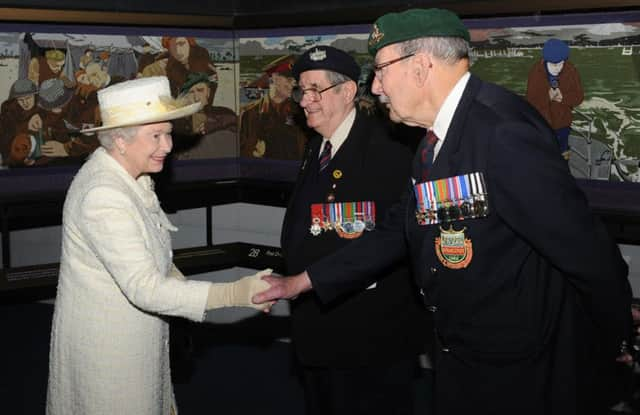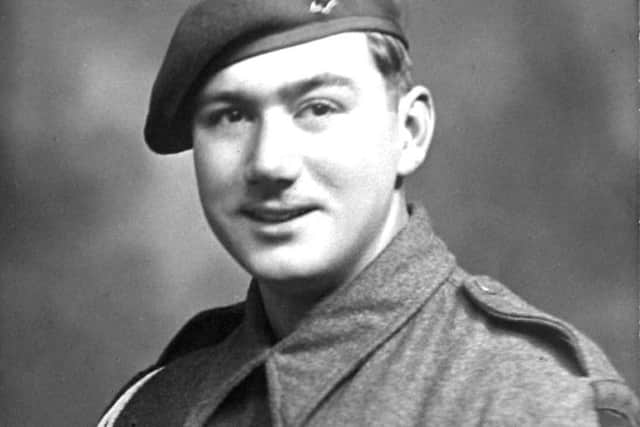OBITUARY: Eddie Wallace '“ fireman, policeman and D-Day veteran


From wartime fireman to long-serving policeman via the carnage of the D-Day beaches, Eddie Wallace lived a life few could imagine today.
So it is with great sadness I have to report that the former Portsmouth City Police officer and wartime police/fireman Sergeant Eddie Wallace has died after a short illness. He was 94.
Advertisement
Hide AdAdvertisement
Hide AdHe was a regular contributor to The News letters page but, more than that, he assisted me no end when researching photographs, especially anything to do with the blitz on the city and fire engines.


He was always up front and a mine of information about his city, Portsmouth, of which he was so very proud.
When I asked him a question about some incident or other he would often say: ‘I’ll tell you what I know, but do not print it. You will never read in books what I, and many others, saw.’ I always kept his confidence.
Eddie fought the war on two fronts, firstly as a police/fireman in the early years of the Second World War and in mainland Europe for the second part. As luck had it, the dropping of the bomb on Hiroshima saved him from a Far East posting to fight the Japanese.
Advertisement
Hide AdAdvertisement
Hide AdOn the night of January 10, 1940, he was on duty for hours on end trying to extinguish fires that raged around the city centre. He was on the third storey of a building in Arundel Street and he looked across to see the C&A building, (now Debenhams) ablaze from the pavement to the roof. The building he was in soon became an inferno and he and his colleagues had to flee before being burned alive. On reaching ground level in Commercial Road a bomb exploded In Woolworth’s, the blast throwing Eddie across the pavement.


I used to visit him every two months or so, taking a cake my wife had baked for him to his Milton home, and would sit with him for hours as he recounted the history of Portsmouth in the 20th century.
Herbert Edward George Wallace, known to all as Eddie, was born at 5, Essex Road, Milton, Portsmouth, in his maternal grandmother’s bedroom, she being a midwife. The house was directly opposite Eastney Police Station in which Eddie was to serve many years later.
His male grandparents, father and several uncles were all artillerymen or police officers so it was only natural for Eddie to follow suit.
Advertisement
Hide AdAdvertisement
Hide AdDuring the First World War, his father served in the Royal Irish Constabulary while uncles served with Portsmouth City Police, the Metropolitan Police and the Air Ministry Constabulary.
Eddie went to Milton Road School being taught by a teacher who taught his parents. At 12 he attended a private school, Lake Road Academy (Blakes), and then Mile End House School (Olivers).
At 16, and wanting to join the police, Eddie upped his age a year and joined the Portsmouth City Police as a cadet in the City Fire Brigade. Most police forces of the time had regular fire brigades as one of its divisions.
He was based in the men’s section house in Park Road, now King Henry 1 Street. The quarters were above the appliance room of the Central Fire Station. It’s now a night club.
Advertisement
Hide AdAdvertisement
Hide AdAlthough only teenagers, the cadets performed the same drills as regular firemen and went to shouts on fire engines when necessary. At 18 the cadets were sworn in as constables.
Being a member of the regular brigade meant Eddie fought many fires in the Blitz during heavy bombing raids. He was machine-gunned at Portchester while helping to put out a fire on a petroleum barge.
In August 1941 the regular fire brigades and the Auxiliary Fire Service, the AFS, were amalgamated to form the National Fire Service and Eddie was sworn in as a constable based at Albert Road Police Station (now the Victoria and Albert pub) which also covered Eastney Police Station. He remained there until drafted into the army and found himself in the Honourable Artillery Company.
On D-Day, June 6, 1944, Eddie’s unit landed with the Canadians at 8.30am on Juno Beach near Courselles. He remained with the regiment through Normandy, Belgium, Holland and into Germany. His unit saw action at the Battle of the Bulge during late December 1944 and ended up as occupying troops in Osnabruck, Germany.
Advertisement
Hide AdAdvertisement
Hide AdAt the end of the war Eddie thought he might make it home but his unit were sent to Antwerp for a troopship to take them to the Far East to fight the Japanese. But the dropping of the atom bombs on Japan saved Eddie from that fate.
In November 1945, Eddie was demobbed and returned to Portsmouth to resume his police duties. He reported for duty and was ordered to start back at Albert Road on Christmas Day. He retired as station sergeant on September 3, 1971.
In 1948, after at the request of the Rev Fletcher Campbell, the vicar of St James’s Church, Milton, he reopened Eastney Boys’ Club in Prince Albert Road and taught the lads how to row, swim, play football and cricket and took them camping.
When he transferred to Cosham Police Station in the 1950s he became a committee member of Hillside Boys’ Club, Paulsgrove, on which he served for 32 years and was a prime mover in winning a government grant to rebuild the club.
Advertisement
Hide AdAdvertisement
Hide AdIn later life he joined the Portsmouth & Gosport branch of the national Association of Retired Police Officers and was secretary for a year.
He was also an active member of the Royal Artillery Association his Regimental Old Comrades’ Association and the Royal British Legion. Not content with all that, in 1984 he joined the Southern Branch (Portsmouth) of the Normandy Veterans’ Association and in 1987 was elected chairman, a position he held until it was disbanded.
Eddie Wallace: born November 23, 1923, died Saturday, April 21, 2018.
Funeral arrangements to be announced.
FAMILY
Eddie met his wife Joan in 1940 when she was walking across the training yard in Park Road to join the AFS. In Eddie’s case, it was ‘love at first sight’ as he put it.
Advertisement
Hide AdAdvertisement
Hide AdUnfortunately, things got off to a bad start when he accidentally sprayed water from a hose he was cleaning on her shoes. It was several weeks before Eddie persuaded Joan to go out with him.
But love blossomed between them and Eddie always met Joan whenever possible after end of duty at whichever station he was serving at.
In June, 1945 Eddie’s unit was based in Waasmunster, Belgium, and he managed to get two weeks’ leave and married Joan in St James’s Church, Handsworth, Birmingham, where the family had moved to.
During their happy marriage Eddie and Joan raised two children, daughter Penny and son Michael who followed his father into the army. This led to a grandchild Sarah and two great grandchildren Natalie and Cameron.